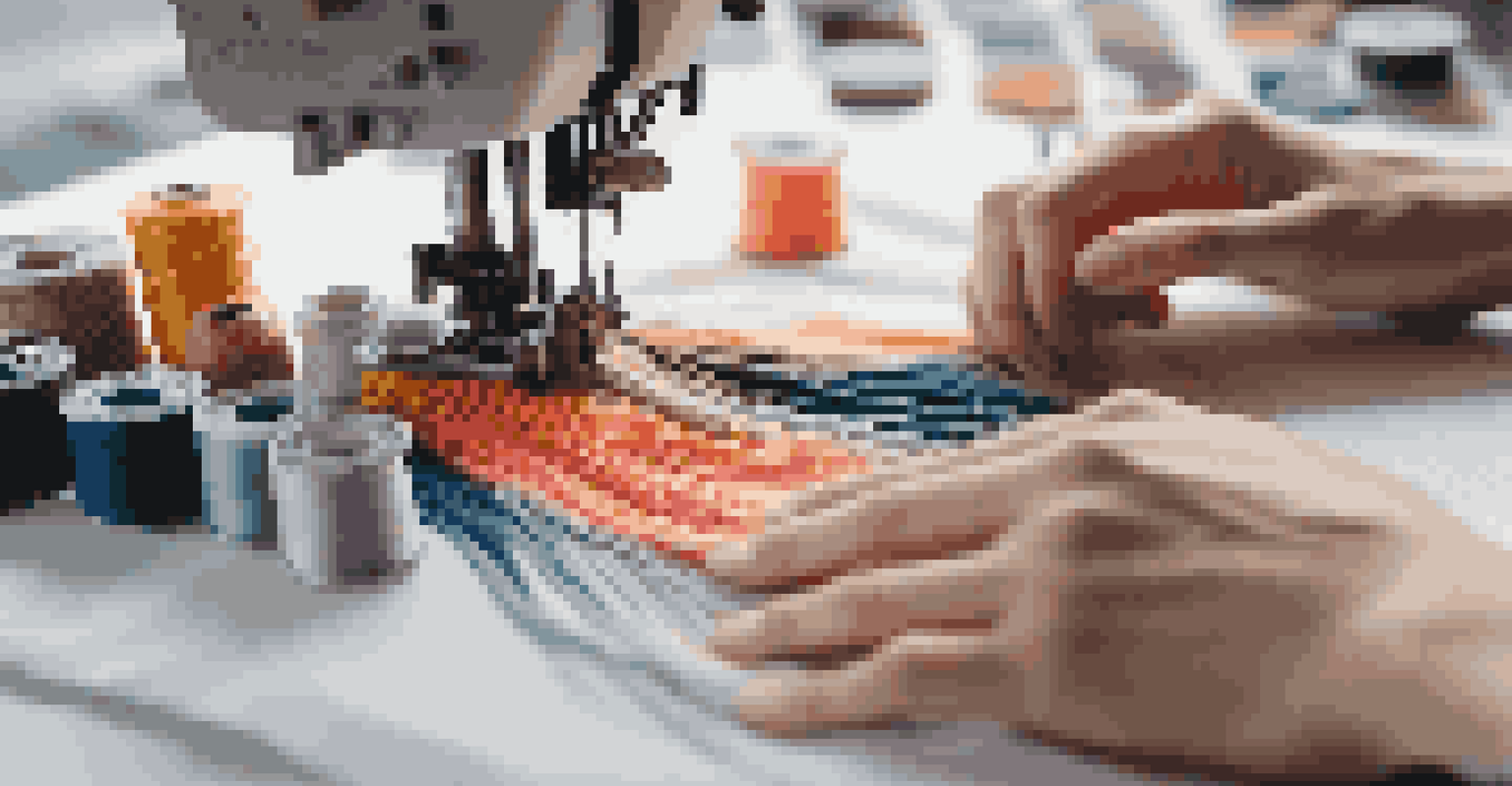The Role of Fashion Weeks in Promoting Sustainability

Fashion Weeks: A Platform for Sustainable Innovation
Fashion weeks have evolved from mere showcases of luxury to platforms for innovation. Designers are increasingly utilizing these events to present sustainable collections, highlighting eco-friendly materials and ethical practices. This shift not only attracts attention but also encourages other brands to follow suit, creating a ripple effect throughout the industry.
Fashion is a way to express who you are without having to say a word.
For instance, brands like Stella McCartney have consistently used these events to push the boundaries of sustainable design, captivating audiences with their commitment to the environment. This kind of visibility is crucial in a world where consumers are becoming more conscious about their choices. By placing sustainability at the forefront, fashion weeks are reshaping industry norms.
Moreover, these events serve as a litmus test for new sustainable technologies and practices. As innovative solutions are showcased, they inspire emerging designers and established brands alike to adopt eco-friendly methods. This evolution in focus is vital for driving long-term change within the fashion landscape.
Raising Awareness: The Impact of Celebrity Influence
Celebrities play a significant role in amplifying sustainability efforts during fashion weeks. When high-profile figures don sustainable designs, they draw media attention and public interest, making eco-conscious fashion desirable. This influence not only engages existing fans but also attracts a wider audience who may not have previously considered sustainable options.

Take for example the recent trend of celebrities wearing vintage or upcycled outfits on red carpets. This not only showcases unique fashion statements but also promotes a message of sustainability. By choosing to wear sustainable designs, these celebrities set a powerful example for their followers and the fashion community.
Sustainable Innovation at Fashion Weeks
Fashion weeks are transforming into platforms for showcasing sustainable designs and practices, encouraging industry-wide change.
The visibility provided by fashion weeks allows these messages to resonate further. As more celebrities advocate for sustainability, it shifts public perception and encourages fans to support brands that prioritize ethical practices. This collective effort can significantly shape consumer behavior and attitudes towards sustainable fashion.
Collaboration: Brands Joining Forces for Sustainability
Fashion weeks have become a breeding ground for collaboration, with many brands partnering to promote sustainability. These partnerships often result in innovative collections that combine the expertise and resources of multiple brands, creating unique sustainable offerings. This collaborative spirit not only enhances creativity but also amplifies the message of sustainability.
Sustainability is not a trend. It is the future.
For instance, the partnership between brands like H&M and designer collaborators has resulted in collections that prioritize recycling and sustainable materials. Such collaborations can leverage the strengths of each brand, leading to impactful change. When brands work together, they can tackle sustainability challenges more effectively than they could alone.
Furthermore, these collaborations often spark conversations about sustainability within the industry. By showcasing joint efforts during fashion weeks, brands effectively raise awareness among consumers and industry insiders alike. This collaborative approach can help establish a collective responsibility towards sustainable fashion.
Engaging Consumers: Interactive Experiences at Fashion Weeks
Fashion weeks are adapting to engage consumers directly, often incorporating interactive experiences that highlight sustainability. This shift allows attendees to connect with the brands on a deeper level, encouraging them to think critically about their fashion choices. Engaging experiences can include workshops, panel discussions, and immersive installations that focus on sustainable practices.
For example, some fashion weeks have introduced pop-up exhibits showcasing sustainable materials and production techniques. This hands-on approach not only educates consumers but also fosters a sense of community around sustainable fashion. Attendees leave with a better understanding of the importance of eco-friendly practices in the industry.
Celebrity Influence on Sustainability
Celebrities wearing sustainable fashion during fashion weeks amplify awareness and shift public attitudes towards eco-friendly choices.
Moreover, by involving consumers in these conversations, fashion weeks create a platform for dialogue about sustainability. As people share their thoughts and experiences, it cultivates an environment where sustainability becomes a shared goal. This level of engagement is key to driving meaningful change in consumer behavior.
The Role of Technology: Innovations Driving Sustainability
Technology is playing an increasingly important role in promoting sustainability at fashion weeks. From virtual runway shows to digital fabric innovations, tech is helping to reduce the carbon footprint of these events. By adopting new technologies, the fashion industry can explore more sustainable practices without compromising creativity or style.
For instance, 3D printing is revolutionizing how designers create garments, allowing for zero-waste production methods. During fashion weeks, designers are showcasing these innovations, demonstrating how technology can align with sustainable goals. This not only attracts attention but also encourages other brands to rethink their production processes.
As technology continues to evolve, it opens up new possibilities for sustainable fashion. Fashion weeks are uniquely positioned to highlight these advancements, educating both industry professionals and consumers. By embracing technology, the fashion industry can pave the way for a more sustainable future.
Global Perspectives: Sustainability in International Fashion Weeks
Sustainability initiatives are gaining traction not just in major fashion capitals but also in emerging markets. International fashion weeks are increasingly showcasing local designers who prioritize eco-friendly practices, bringing diverse perspectives to the forefront. This global exchange of ideas enriches the conversation around sustainability in fashion.
For example, fashion weeks in cities like Lagos and Mumbai are highlighting traditional techniques that align with sustainable practices. These events provide a platform for local artisans to showcase their work, demonstrating that sustainability can be both fashionable and culturally relevant. This diversity can inspire other designers to incorporate sustainable practices into their own work.
Collaboration Drives Sustainable Change
Partnerships between brands during fashion weeks foster innovative sustainable collections and raise collective awareness about responsible practices.
Moreover, as different regions share their approaches to sustainability, it fosters a collaborative global movement. Fashion weeks become a melting pot of ideas, encouraging designers from various backgrounds to learn from each other. This collective effort is essential for creating a more sustainable fashion industry worldwide.
The Future of Fashion Weeks: A Commitment to Sustainability
As the fashion industry continues to evolve, the commitment to sustainability during fashion weeks is likely to strengthen. With consumers increasingly demanding transparency and eco-friendly practices, brands must adapt or risk being left behind. Fashion weeks will play a crucial role in shaping this future by prioritizing sustainable initiatives.
In the coming years, we can expect to see even more emphasis on responsible sourcing, ethical labor practices, and waste reduction during these events. By integrating sustainability into their core values, fashion weeks can inspire a new generation of designers who prioritize environmental consciousness. This shift can create a lasting impact on the industry.

Ultimately, the future of fashion weeks lies in their ability to foster a culture of sustainability. By championing innovative practices and encouraging collaboration, they can lead the charge toward a more sustainable fashion industry. This commitment will not only benefit the environment but also enhance the overall perception of fashion as a force for positive change.